The NBA’s 2023/24 regular season will wrap up on Sunday , which means we now have just three days left in the season. Here are a few things worth keeping an eye on during those three days:
Playoff berths and seeding
Eastern Conference:
The Celtics locked up the No. 1 seed in the East long ago, but no other Eastern Conference club between No. 2 and No. 8 has clinched a specific seed, and the Bucks and Knicks are the only other teams that have secured playoff berths. Here are the standings in that section of the East entering Friday:
- Milwaukee Bucks (49-31)
- New York Knicks (48-32)
- Cleveland Cavaliers (47-33)
- Orlando Magic (46-34)
- Indiana Pacers (46-34)
- Philadelphia 76ers (45-35)
- Miami Heat (44-36)
 The NBA’s schedule-makers did well with Friday’s slate — the Magic will face the Sixers in Philadelphia, while the Cavaliers host the Pacers in Cleveland.
The NBA’s schedule-makers did well with Friday’s slate — the Magic will face the Sixers in Philadelphia, while the Cavaliers host the Pacers in Cleveland.
Road wins by Orlando and Indiana would lock in the East’s six playoff teams, leaving the 76ers and Heat to compete in the 7-8 play-in game. Victories by the Cavs and Sixers, on the other hand, would clinch Cleveland’s playoff spot and put Orlando, Indiana, and Philadelphia in a three-way tie for the final two playoff spots, with Miami – which hosts the Raptors on Friday – potentially just a single game back.
The Cavaliers (vs. Hornets), Pacers (vs. Hawks), Sixers (vs. Nets), and Heat (vs. Raptors again) all have favorable home matchups on Sunday. The Magic may be the one exception, as they’ll be hosting the Bucks, who will likely need at least one win this weekend to clinch the No. 2 seed. Milwaukee visits the Thunder on Friday in a challenging matchup, while the Knicks’ schedule wraps up with very winnable home games against the Nets and Bulls.
Western Conference:
Five teams have clinched playoff spots in the West, but the No. 1 seed remains up for grabs, with the Nuggets (56-24) holding a slight edge over the division-rival Timberwolves (55-25) and Thunder (55-25).
Denver is on the road for its final two games, but faces a pair of lottery teams in San Antonio and Memphis. Winning both of those contests would lock up the No. 1 seed for the Nuggets, but they can’t afford a misstep, since both the Wolves and Thunder hold the tiebreaker edge over them. Still, Minnesota (vs. Atlanta, vs. Phoenix) and Oklahoma City (vs. Milwaukee, vs. Dallas) have tougher weekend matchups.
The Clippers (51-29) and Mavericks (50-30) are locked into the 4-5 matchup in the West, but home-court advantage remains up for grabs. Since L.A. has the tiebreaker advantage, the Clippers need just one more win or one Mavs loss this weekend to secure the No. 4 seed. Since the Clips are at home vs. Utah and Houston, that’s a pretty safe bet.
The rest of the West’s playoff picture looks like this:
- New Orleans Pelicans (48-32)
- Phoenix Suns (47-33)
- Sacramento Kings (45-35)
- Golden State Warriors (45-35)
- Los Angeles Lakers (45-35)
Either the Pelicans or the Suns will claim the sixth guaranteed playoff spot in the West, while the other will have to win a play-in game to secure their playoff berth.
Phoenix has the tiebreaker edge over New Orleans, but as long as the Pelicans win out, they remain in the driver’s seat. That’ll be easier said than done though. The Pels have a showdown with the Warriors in Golden State on tap for Friday night, then host the Lakers on Sunday. The Suns also have a difficult path to two wins though, with road games against the Kings on Friday and Timberwolves on Sunday.
If the Pelicans beat out the Suns for the No. 6 seed, it’ll be four Pacific teams in the play-in tournament, with the Kings, Warriors, and Lakers all battling to avoid ending up in the 9-10 matchup — the winner of that game would have to win a second play-in game (on the road) to earn the No. 8 playoff seed, so getting into the 7-8 play-in contest would be big.
Sacramento has been the coldest of those three teams as of late, but holds the tiebreaker advantage and finishes its season by hosting the lottery-bound Trail Blazers on Sunday. A win over Phoenix on Friday would be huge for the Kings, almost certainly assuring them of a spot in the 7-8 play-in game.
The Warriors also close the season on Sunday with a favorable matchup (vs. Utah), so if they can pull out a home victory over the Pelicans on Friday, they’ll be in good position to get either the No. 8 or 9 seed.
The Lakers have the friendliest matchup on Friday (at Memphis), but would place last in a three-team tie with the Kings and Warriors, so they’ll be under pressure to win in New Orleans on Sunday.
Here are the details from the NBA on the clinching scenarios in both conferences for Friday’s games.
Traded draft picks and lottery odds
The Kings‘ 2024 first-round pick will be sent to the Hawks if it lands outside the top 14. Given that Sacramento is now in play-in territory and is at risk of missing the playoffs, that’s a first-rounder worth watching closely. That obligation to Atlanta would be rolled over to 2025 if the Kings are a lottery team this year.
There are several more traded first-round picks that have a wide range of possibilities depending on where teams finish in the standings and how the play-in tournament plays out. For example, the Pacers owe the Raptors their (top-three protected) first-round pick. If Indiana clinches a top-six spot in the East, that pick figures to be around 18 or 19. On the other hand, if the Pacers fall into play-in territory and then get eliminated, it’ll be a lottery selection.
The Warriors‘ (top-four protected) pick to the Trail Blazers and the Lakers‘ (unprotected) pick to the Pelicans also fall into this category. It’s worth noting that New Orleans has the option to defer Los Angeles’ first-rounder to 2025. There has been an expectation that the Pels might go that route due to this year’s weak draft class, but it’ll be hard to pass on that ’24 pick if it’s in the lottery.
Speaking of the lottery, there are still some odds to be finalized there. The Pistons and Wizards will be among the teams with a league-best 14% chance at this year’s No. 1 pick, but who will join them as the third team in that group? The Spurs (20-60), Hornets (20-60), and Trail Blazers (21-59) all still have a chance.
For what it’s worth, in the event that two or more of those teams finish with identical records, the odds for their lottery slots will be averaged out, as we explain in our glossary entry on the draft lottery.
For instance, let’s say San Antonio, Charlotte, and Portland each lose their final two games and the Spurs and Hornets are tied for the NBA’s third-worst record. In that scenario, instead of the third-worst team having a 14% shot at the top pick and the fourth-worst team having a 12.5% chance, a coin flip would determine which team’s odds are 13.3% and which team gets a 13.2% chance at No. 1.
Notably, the Raptors also need one more loss – or one more Grizzlies win – to secure the No. 6 spot in the lottery standings, which would significantly increase their odds of hanging onto the top-six protected first-rounder they owe the Spurs. In that scenario, Toronto would have a 45.8% chance to keep the pick and a 54.2% chance that it slides to No. 7 or lower and is sent to San Antonio.
Award races
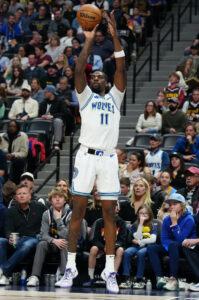 Nuggets center Nikola Jokic appears to have locked up his third Most Valuable Player in the past four seasons, but it’s possible that voters for other end-of-season awards could be swayed by what happens in the final weekend of the season.
Nuggets center Nikola Jokic appears to have locked up his third Most Valuable Player in the past four seasons, but it’s possible that voters for other end-of-season awards could be swayed by what happens in the final weekend of the season.
For instance, if Tyrese Maxey has huge games on Friday and Sunday to help the Sixers secure a top-six seed in the East, it would put an emphatic stamp on his case for Most Improved Player. If Naz Reid has a big weekend for a Timberwolves team that reclaims the No. 1 seed, it would only make him a stronger Sixth Man of the Year candidate.
I wouldn’t expect any awards to be decided by what happens in the next few days, but certain scenarios could help clarify a difficult choice for a voter who’s on the fence.
Teams with open roster spots
As we outlined on Tuesday, there are still a handful of teams with open spots on their standard 15-man rosters. Those teams are as follows:
- Golden State Warriors
- New Orleans Pelicans
- Philadelphia 76ers
- Toronto Raptors
- Note: The Raptors technically have a full 15-man roster on Friday, but will open up a spot on Saturday following the expiration of Malik Williams‘ 10-day contract.
It’s not unprecedented for a team to leave a roster spot open at the end of the season, but it’s somewhat rare — all 30 teams finished the season with full 15-man squads in each of the past two years.
Most of all of these teams are good bets to make a roster move before their final games tip off on Sunday, even if it’s as simple as promoting a two-way player to a standard contract to make him postseason-eligible.

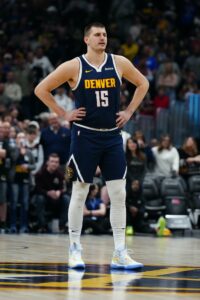

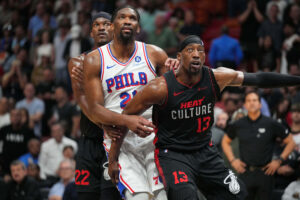 In the early game, the No. 8 Heat will visit Philadelphia and battle the No. 7 Sixers for the right to claim the seventh seed and a first-round matchup with New York.
In the early game, the No. 8 Heat will visit Philadelphia and battle the No. 7 Sixers for the right to claim the seventh seed and a first-round matchup with New York.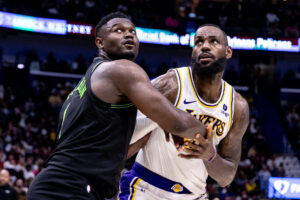 In the early game, the No. 7 Pelicans will host the No. 8 Lakers for the second time in three days. The results of Sunday’s contest weren’t particularly encouraging for the Pelicans, who could have clinched the No. 6 seed in the West with a victory, but trailed all afternoon en route to a 16-point loss.
In the early game, the No. 7 Pelicans will host the No. 8 Lakers for the second time in three days. The results of Sunday’s contest weren’t particularly encouraging for the Pelicans, who could have clinched the No. 6 seed in the West with a victory, but trailed all afternoon en route to a 16-point loss.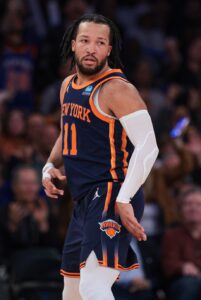 Still, Milwaukee remains at the front of this race. The Bucks own the tiebreaker over the Knicks, so they just need a win – or for all three teams to lose – in order to clinch No. 2. Unfortunately, they’re missing superstar forward
Still, Milwaukee remains at the front of this race. The Bucks own the tiebreaker over the Knicks, so they just need a win – or for all three teams to lose – in order to clinch No. 2. Unfortunately, they’re missing superstar forward  Nuggets center
Nuggets center  Bey, Maxey, and Quickley would have had qualifying offers worth $6,498,258, $6,259,588, and $6,128,004, respectively, if they had fallen short of the starter criteria. Instead, their QOs will each be worth $8,486,620.
Bey, Maxey, and Quickley would have had qualifying offers worth $6,498,258, $6,259,588, and $6,128,004, respectively, if they had fallen short of the starter criteria. Instead, their QOs will each be worth $8,486,620.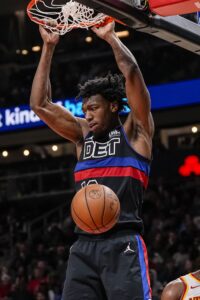 As a former No. 2 overall pick, Wiseman would have been in line for a qualifying offer worth $15,815,870 if he had made at least 41 starts or played 2,000 minutes. Because he fell short, his actual QO will be worth less than half that ($7,744,600).
As a former No. 2 overall pick, Wiseman would have been in line for a qualifying offer worth $15,815,870 if he had made at least 41 starts or played 2,000 minutes. Because he fell short, his actual QO will be worth less than half that ($7,744,600).